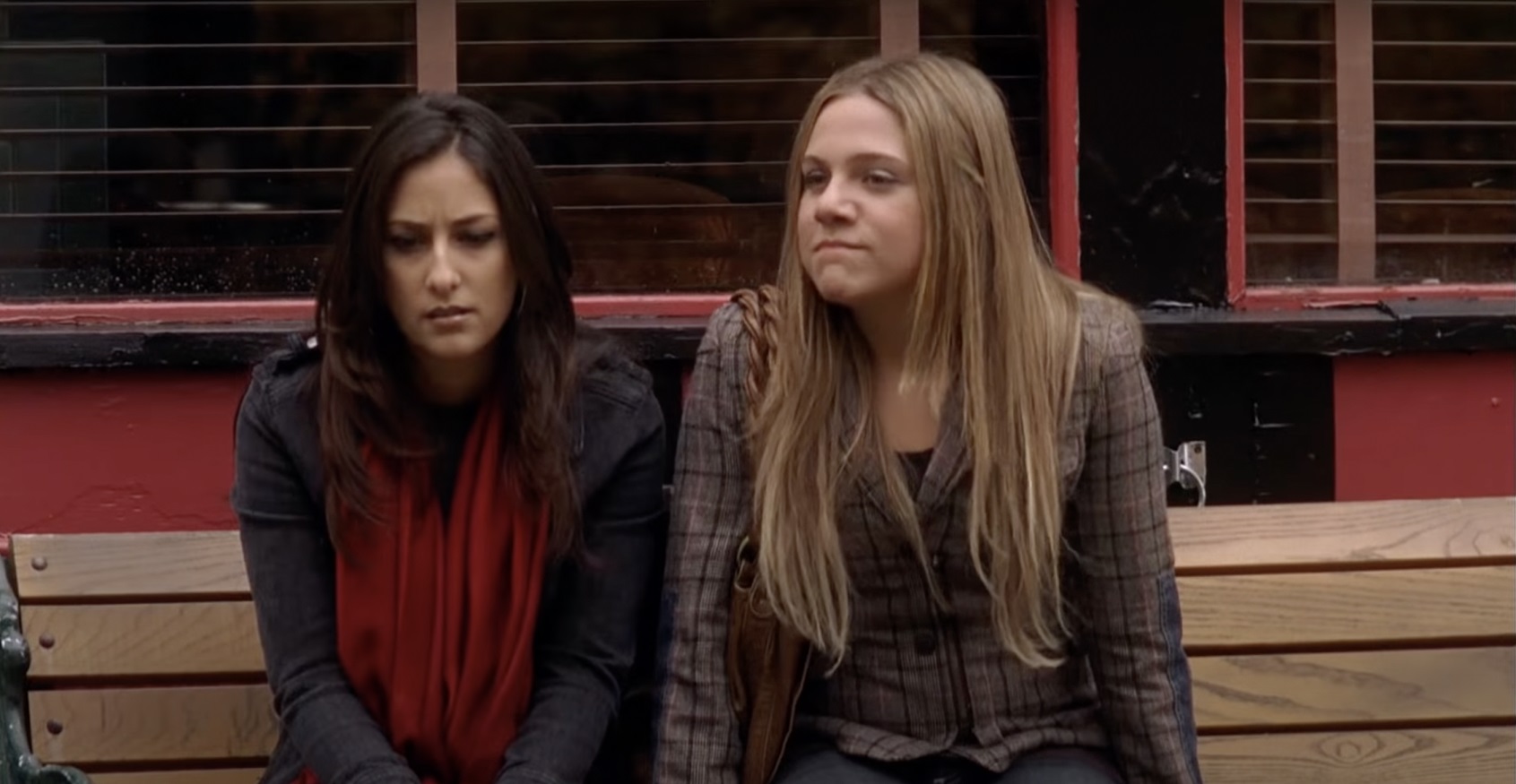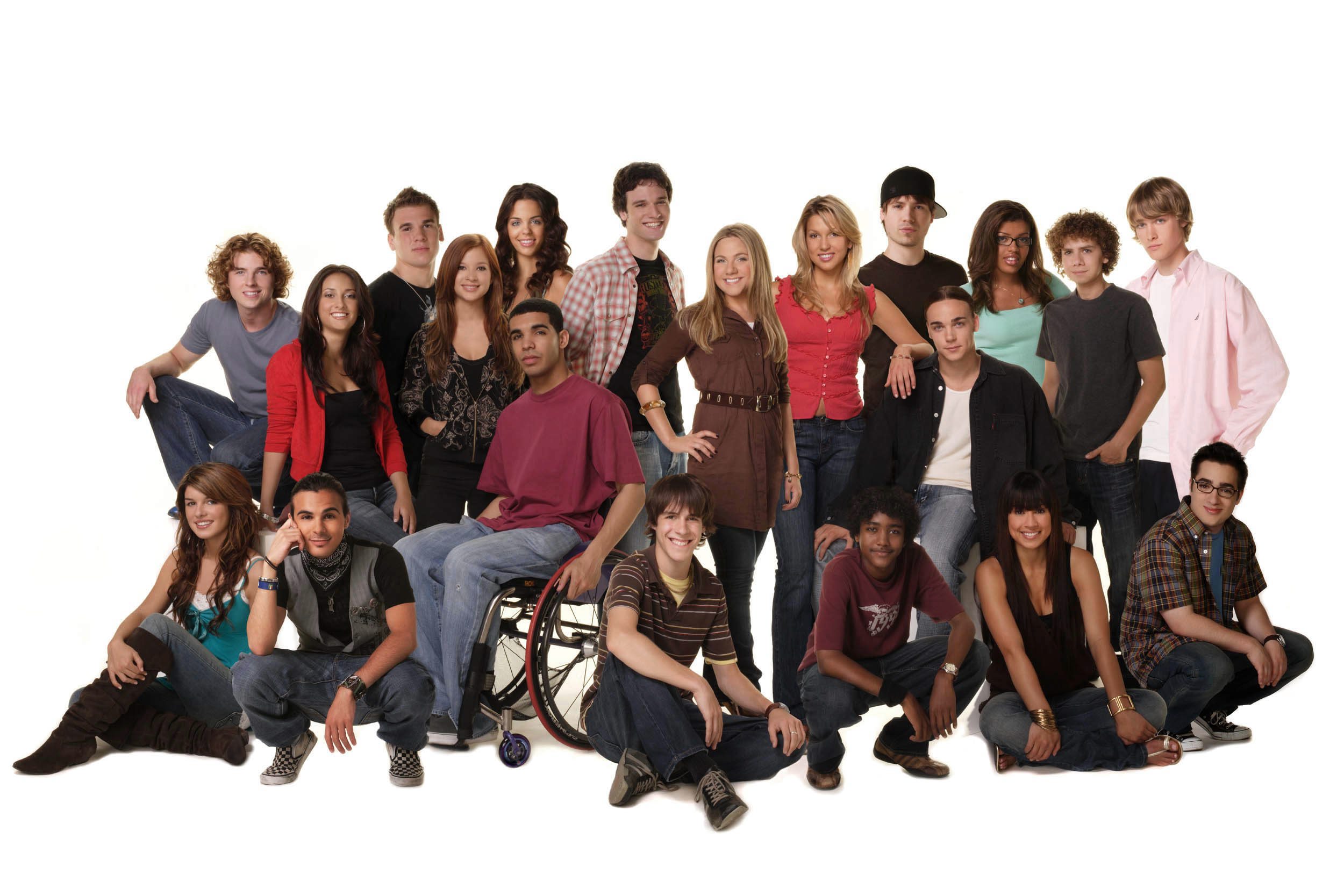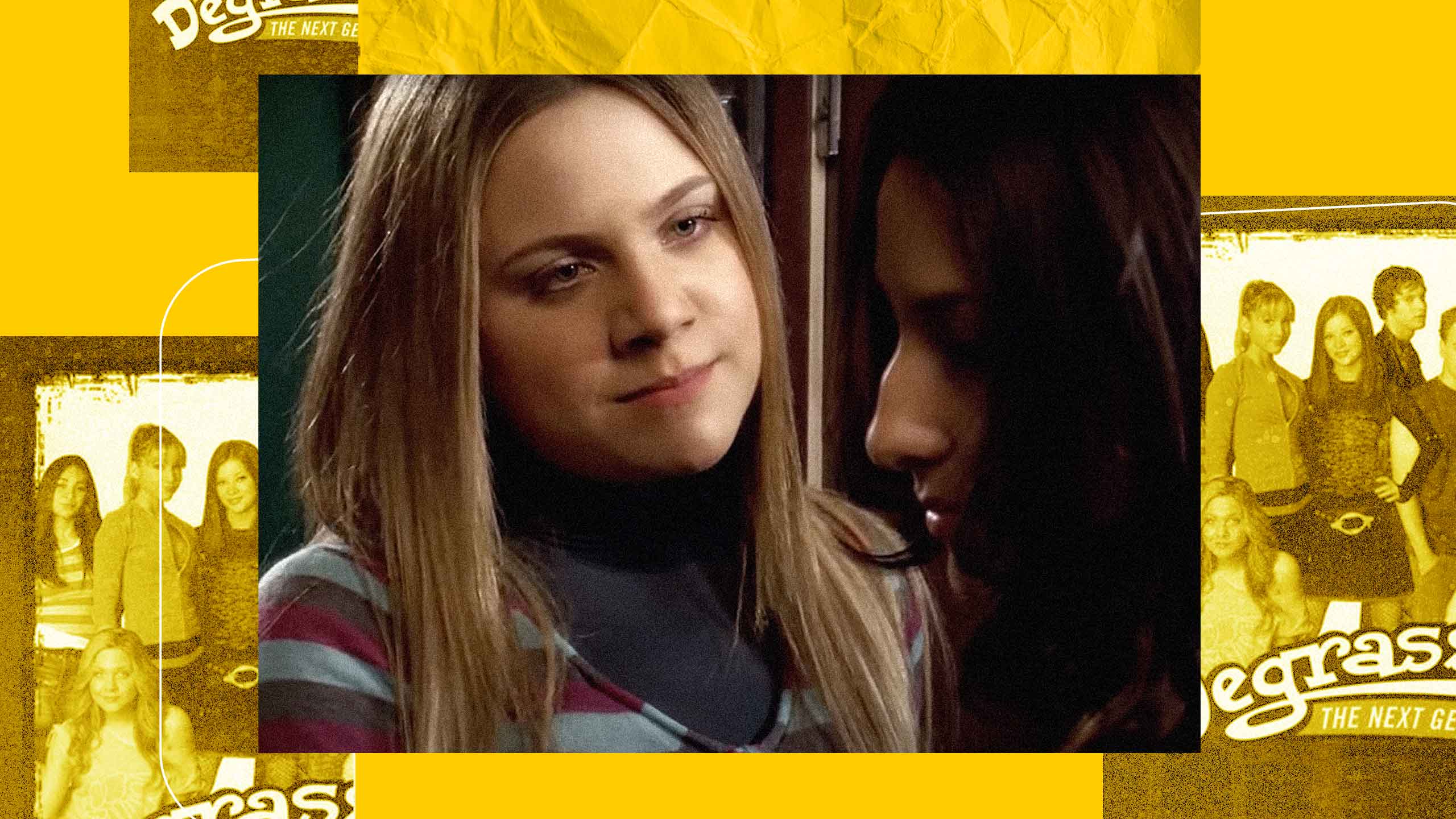What North American kid born in the last 50-or-so years didn’t spend hours upon hours of their adolescence enthralled by the dramatic twists and turns of the Degrassi franchise?
From The Kids of Degrassi Street, which debuted in 1979, to today’s Degrassi: Next Class, the beloved television universe has mixed education and entertainment to help youth see themselves and their stories, no matter how taboo, represented on screen in a way they hadn’t before. And sometimes, like in my case, Degrassi has given teens a window into who they might be if they were to dig a little deeper to find their authentic selves.
I first discovered Degrassi in 2010, when I was 13 and in my first year of high school in Quebec. Degrassi: The Next Generation was already in its 10th season, but heeding the advice of a friend, I started from the first season, which originally aired in 2001. I was immediately hooked. The series’ realistic storylines initially captivated me, like when a young Emma Nelson (Miriam McDonald) meets a guy online who turns out to be a middle-aged catfish, or when Ashley Kerwin (Melissa McIntyre) feels pressured to lose her virginity at the age of 14 to keep her boyfriend interested. But it was the impressive character development that kept me around for the long haul (14 seasons, to be exact).
Every teen drama needs a mean girl and, in the early seasons of DTNG, the role is filled by one Paige Michalchuk (Lauren Collins). Paige is introduced right off the bat as a typical Queen Bee: manipulative, arrogant, superficial and traditionally beautiful.
While I wasn’t exactly a mean girl in high school, I did immediately identify with some of Paige’s qualities. I, too, was ambitious, boy-crazy, feminine in my appearance, highly involved in my school and about as extroverted as they come. I was and have always been outspoken, though I was certainly more concerned with how my words and actions affected others than Paige seemed to be; early in the first season, Paige purposely gives close friend Terri McGregor (Christina Schmidt) bad fashion advice and gets her drunk before a school dance because she’s jealous that a guy likes Terri.
Yet I could tell there was more to her than her edgy persona. Subtle hints of her repressed good-heartedness—like when she discreetly gives Emma a pad when she gets her period for the first time—made me eager to learn more about the person behind the tough exterior.
“Paige is privileged and popular, while Alex is working class and a bit of an outcast.”
Paige’s journey from standard-issue bitch to someone more complex begins in the first couple of seasons. After she is sexually assaulted at a party in the second season and seeks therapy to process her trauma, her vulnerability and empathy begin to shine through. When, in the third season, she discovers a classmate has been self-harming, she convinces her to see the guidance counsellor, marking the beginning of their unlikely friendship. But it’s what Paige goes through in the fifth season that not only transforms her into one of DTNG’s most compelling characters, but the very character I needed to see during adolescence.
During this late-2005/early-2006 season, which I watched just months after starting the series, Paige develops a romantic connection with her enemy-turned-friend Alex Nuñez (Deanna Casaluce)—they came to be known as “Palex”—and ultimately becomes the series’ first bisexual character.
Paige and Alex’s connection develops slowly, beginning with a transition from foes to friends when Paige gets a job working alongside her at a movie theatre concession stand. They come from entirely different worlds—Paige is privileged and popular, while Alex is working class and a bit of an outcast—but their banter-filled friendship expands beyond the workplace and into the halls of Degrassi.
Their connection crosses the line from platonic to romantic when Paige and Alex pretend to be a couple to get into a movie premiere after-party, spend the evening dancing intimately and share a spontaneous first kiss at the end of the night. Paige reacts with confusion and avoids acknowledging what the kiss may mean about who she is and who she is capable of loving. Though viewers can see the feelings she has for Alex, she pulls away and shuts down. Her character hasn’t been homophobic up until this point (Paige’s brother is openly gay), but Paige, within hearing distance of Alex, later tells a friend that both the kiss and Alex meant nothing to her.
Paige thought she knew who she was, which was straight. She’d dated guys before and even been in love. Her reaction was sad yet realistic, which I know because Paige’s experience was so similar to mine.
Like Paige, I shared many a kiss with female friends at parties during my high school years before I examined and accepted what that meant about my identity. For a decade, I dismissed these encounters as meaningless because, while discovering an entirely new part of yourself can be exciting, it is also confronting and terrifying. And like Paige, an unexpected romantic connection with a friend in university prompted a tiny light bulb to go off in my head—one I was not yet ready to address and so quickly shut off.
For the first 22 years of my life, when I pictured my future, I saw a cisgender man standing next to me. I saw a traditional life filled with heterosexual love, biological children and a dog; a life free from the fear of prejudice and judgement. Coming to terms with the notion that your future may look different than what you’d always imagined for yourself is no simple thing.
Thankfully, it didn’t take Paige long to come to terms with the fact that she wanted to be with Alex, who officially comes out as a lesbian to her ex-boyfriend that season. It took just one episode and a pep talk from an older friend for Paige to honour her true feelings. She eventually asks if Alex has “room for someone who’s ready to stop worrying about what other people think.” As for me, two years after my own lightbulb lit up, in the midst of a global pandemic that left me with little to do but reflect on my life and the person I want to be, I was finally able to piece together my sporadic queer experiences and accept—even embrace—them as a new part of myself. I have no doubt that watching a femme teenager work to overcome her own internalized biphobia played a part in my journey.
“This isn’t about you, though, it’s about me. And right now I’m about being free to date who I want to date—girl or boy.”
Paige’s journey towards self-acceptance wasn’t linear, though. It rarely ever is. Throughout the show she never explicitly uses the word “bisexual” to describe herself, which, to me, suggests her ongoing struggle.
In one particularly empowering scene in the fifth season, however, she does make it very clear to her peers that it is her journey and her life. In true Paige fashion, she isn’t going to let anyone dictate how she lives it. In response to a friend who says she “can’t keep up” with Paige’s sexuality, Paige tells her: “This isn’t about you, though, it’s about me. And right now I’m about being free to date who I want to date—girl or boy.”
Paige’s assertion stuck with me long after I watched the scene play out from my childhood bedroom; it replayed in my head over and over as I switched the settings on my dating apps to “everyone.”
But just as it has for me, that confidence ebbed and flowed for Paige. Shortly after graduating high school, in the sixth season, she once again struggles to accept her queer identity. “Look, you’re cool with being a lesbian, but I don’t know what I am,” she tells Alex mid-fight. Though Paige and Alex are just friends at this point in the series, there is still something between them. But Paige’s continued reluctance to declare her sexuality for fear of disappointing her family prevents her from going all in on their relationship. Alex is, of course, frustrated with Paige’s ongoing fickleness: “The word is bisexual, Paige, and it’s just a label. Who cares?”
But labels do matter, at least to some of us. They can help us feel secure in who we are and allow us to share that identity with the world. Though Paige does, at times, own her sexuality, her unwillingness to label herself makes her on-and-off relationship with Alex so much more unstable.

It took me a long time to embrace a label, but doing so has felt freeing in a way I didn’t even know I had been longing for. During the pandemic, in October 2020, my roommates and I were dancing to music from our teens when I drunkenly blurted out “I’m bi.” That was the first time I felt like I was truly being honest about my sexuality.
This declaration came exactly a decade after I had started watching DTNG. Though I like to think I’ve now surpassed Paige in my self-acceptance, I am certain my journey was shorter than it would have been because of watching hers. Knowing what’s possible for your own life is often the result of seeing that very thing play out in someone else’s—whether in popular culture or real life.
The rest of aughts television didn’t give me much to work with. Gilmore Girls (2000 to 2007) didn’t feature one out character until its 2016 revival, and the original series regularly made jokes at the expense of queer identities. One Tree Hill (2003 to 2012), another wildly popular teen drama from the early aughts, featured just one queer character, Anna Taggaro (Daniella Alonso), in its nine years on television.

Credit: CATV/Everett Collection/CP Images
DTNG featured at least 20 LGBTQ2S+ characters during its 14 years on the air, and Palex’s relationship, spanning four seasons from 2004 to 2008, was undeniably progressive for its time. Yet Paige and Alex don’t get to share nearly as many intimate on-screen moments as their hetero counterparts; many of of their scenes together are spent bickering—they break up and get back together too many times to count. Once, in a soap opera-like twist, Paige breaks up with Alex because she finds out she’s been working as an exotic dancer to help pay the bills.
If that plotline was unfolding today, I’d like to think Paige wouldn’t shame her partner for being a sex worker. And these days, as the demand for authentic representation has rightfully never been stronger, I’d hope Paige would be portrayed by a queer actor—even though, despite her straightness, Collins does Paige justice in her performance, managing to create a relatable, believable and thoughtful character.
Mainly, I’d hope that if Paige and Alex were on screen in 2021, they’d both be given the dignified endings they deserve. In the seventh season, Alex exits the series for good following one of many fights with Paige in which they butt heads, this time over Paige’s career ambitions and Alex’s lack thereof. The last we hear, Alex is going to stay with a cousin in the nearby city of Ajax to figure out her “options.”
Sadly, Paige’s exit from the series is also less than graceful. She is cast in (and eventually fired from) a Hollywood movie, returns to her diva-with-a-bad-attitude ways and completes her Degrassi journey the same way she starts it: as an insecure mean girl who cares too much about what other people think.
Why the show’s writers decided against giving this character—the character who arguably experienced the most growth of anyone on DTNG—the (preferably queer) happy-ever-after she deserves will forever confound me. But I like to think the ending Paige should have gotten lives on in those of us she touched; those of us living more authentic lives today because we met Paige Michalchuk on our screens when we unknowingly needed her most.


 Why you can trust Xtra
Why you can trust Xtra


